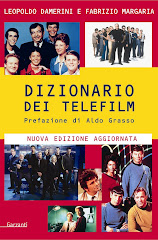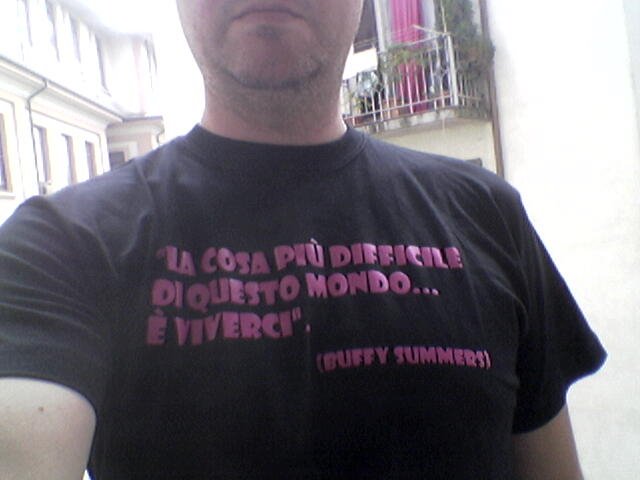PICCOLO GRANDE SCHERMO/L'EDICOLA DI LOU - "Star Trek Into Darkness" sbanca e sbarca là dove nessun predecessore è giunto prima
VARIETY
Il nuovo "Star Trek Into Darkness" sbanca i botteghini e arriva là, dove nessun film della saga è giunto prima
"
J.J. Abrams sets
his filmmaking to “stun” for “
Star Trek Into Darkness,” a sequel in
every respect equal or even superior to its splendid 2009 predecessor,
which lovingly and cleverly rebooted Gene Roddenberry’s long-running
space opera following the black hole of 2002’s “Star Trek Nemesis.”
Markedly grander in scale, although never at the expense of its richly
human (and half-human) characters,
“Into Darkness” may not boldly go
where no “Trek” adventure has gone before, but getting there is such a
well-crafted, immensely pleasurable ride that it would be positively
Vulcan to nitpick. Global box office cume should easily warp past the
prior pic’s $385 million for this sturdy Paramount tentpole, which opens
overseas May 9 before beaming down Stateside one week later.
Abrams, whose last pic was the lyrical “E.T.”/“Close
Encounters” homage “Super 8,” here tips his hat to the “Indiana Jones”
series, opening with a thrilling setpiece that finds Kirk (Chris Pine)
and Bones (the sly, loose-limbed Karl Urban) on the run from a tribe of
very angry natives on the planet Nibiru. The natives, decked out in
head-to-toe clay body paint, shimmer like human ceramics as they chase
the Starfleet officers through a crimson forest, the lush colors of
returning d.p. Dan Mindel all but searing the screen. Meanwhile, Spock
(Zachary Quinto) toils away nearby, attempting to insert a high-tech ice
cube into the raging volcano that threatens to destroy Nibiru and its
inhabitants — a dangerous mission that quickly goes awry, building to a
classic “Trek” standoff between stubborn Vulcan logic and impulsive
human emotion.

The Enterprise crew has scarcely recovered from that one when, back
on Earth, a terror bombing lays waste to a top-secret Starfleet
intelligence facility and brings to the fore a new galactic baddie: a
rogue Starfleet officer named John Harrison (Benedict Cumberbatch) who
claims credit for the attack and, after an equally brazen follow-up,
hightails it deep into Klingon-controlled space. The hawkish Adm. Marcus
(Peter Weller) dispatches the Enterprise in hot pursuit, with this
familiar-sounding objective: Shoot first, ask questions later, and avoid
starting a war with the locals. Welcome to “Star Trek Into Zero Dark
Thirty.”
Only, this John Harrison is a slippery sort who, when given the
chance, claims not to be the villain at all, but rather a pawn in
someone else’s deadlier scheme. And for much of its running time, “Star
Trek Into Darkness” makes a good guessing game out of whether this
mysterious stranger with the glacial glare and bones seemingly made of
steel is friend, foe or — like the “old Spock” of Abrams’ first “Trek” —
a little bit of history repeating. It hardly matters, because whatever
Cumberbatch is playing, he’s wonderful to watch, infusing the movie with
the kind of exotic grandeur Eric Bana’s wan Romulan henchman (arguably
the weakest link in the 2009 film) largely lacked. Also making her
maiden “Trek” voyage is the lovely Alice Eve as an ambitious science
officer who lies her way on to the Enterprise deck and makes goo-goo
eyes with the good Captain. She is not, it turns out, the ship’s only
stowaway.
Having previously established an alternate “Trek” timeline in which
all the events of prior series and movies still happened, but aren’t
necessarily doomed to recur, Abrams and returning writers Roberto Orci
and Alex Kurtzman (now joined by “Lost” co-creator Damon Lindelof) here
take that idea and run with it, invoking prior “Trek” lore when it suits
them, freely branching off into new directions when it doesn’t. (Hell,
there’s even some trouble with a tribble.) It’s a tricky business,
balancing reverence with reinvention, but like the young Kirk, Abrams
seems altogether more comfortable in the captain’s chair this time — not
just in the large-scale action scenes, but particularly in the quieter
ones, where you can sense his real investment in these characters and
his confident touch with actors.

The film builds particularly well on the burgeoning Kirk-Spock
friendship, with Pine showing reserves of vulnerability and doubt
beneath his cocksure exterior, while Quinto adds gravitas to Spock’s
eternal inner conflict — and his deepening romance with Lt. Uhura (Zoe
Saldana). But make no mistake: The action, when it comes, is superbly
executed, whether it’s giant vessels making mincemeat of one another, or
the simpler excitements of old-fashioned hand-to-hand combat and foot
chases through crowded promenades.
The best, even-numbered films in the original “Trek” film franchise
were shaped by the guiding intelligence of writer-director Nicholas
Meyer, who laced the Starfleet jargon with high-toned literary
references and a gently self-mocking sense of humor. Abrams, too,
manages to keep the mood buoyant even when the fate of the universe is
hanging in the balance, more than earning his tears when he finally
decides to milk them. But if Meyer’s primary references were
Shakespeare, Dickens and Conan Doyle, Abrams’ are Spielberg, John Hughes
and Cameron Crowe. In defiance of the self-congratulatory snark that
has become de rigueur in Hollywood franchise fare, he brings a
shimmering pop romanticism to “Trek’s” stalwart ideals of friendship,
heroism and self-sacrifice. There’s something bold about that, indeed.
“Into Darkness” is a beautifully modulated and sustained piece of
work across the board, with visual effects that seamlessly meld
live-action and computer-animated elements, given further texture by
old-fashioned celluloid
lensing (with 65mm Imax used for key action scenes). Post-production 3D
conversion by Stereo D ranks among the best of its kind. The Enterprise
has rarely looked sleeker than it does on production designer Scott
Chambliss’ sets. Adding the cherry to the top of this cinematic sundae,
composer Michael Giacchino’s soaring score once again revives Alexander
Courage’s immortal Trek theme for the closing credits".
(
Scott Foundas)
































+1.jpg)




.jpg)












